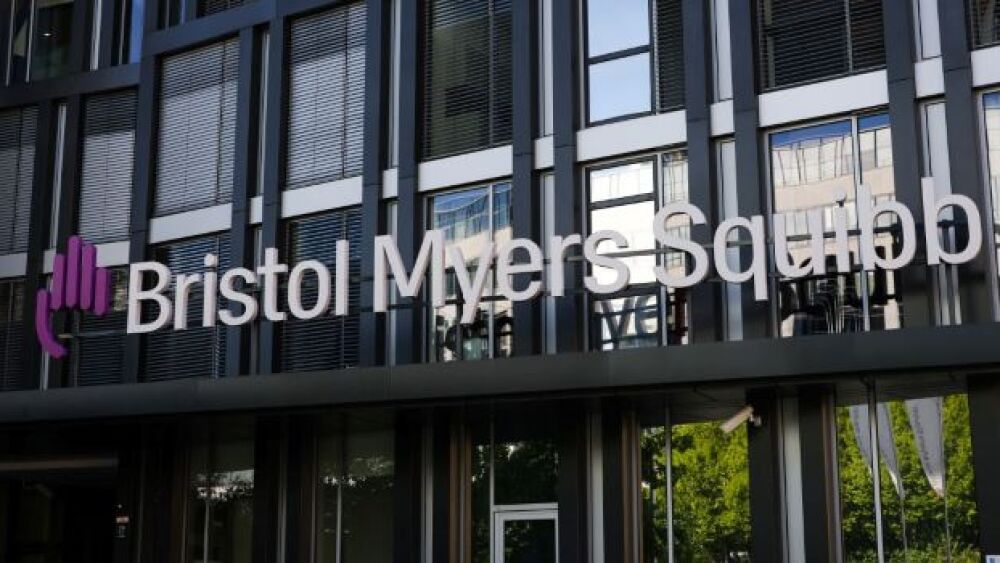Bristol Myers Squibb entered two separate research collaboration and licensing deals, one with San Francisco-based SyntheX and the second with London’s Autolus Therapeutics.
Nitpicker/Shutterstock
Bristol Myers Squibb entered two separate research collaboration and licensing deals, one with San Francisco-based SyntheX and the second with London’s Autolus Therapeutics.
This first partnership will leverage SyntheX’s ToRNeDO platform for protein degradation. The platform discovers molecular glue-based protein degraders using pre-specified E3 ligases and neosubstrates.
Molecular glue degraders are compounds that organize interactions between a target protein and an E3 ubiquitin ligase, which causes the degradation of the target protein.
Ubiquitin attaches to obsolete proteins, signaling to cells that it’s time for them to be disposed of by breaking them down into their component molecules.
BMS is paying upfront cash and an investment in the company. SyntheX is eligible for up to $550 million in performance-based milestones. It is also eligible for royalties based on worldwide net sales of any subsequent commercial products.
Maria Soloveychik, Ph.D., SyntheX’s co-founder and CEO said the company looks forward to combining its ToRNeDO platform with BMS’s clinical development expertise as “we work to discover and deliver the next-generation of TPD therapies for patients in need.”
The company’s pipeline focuses on oncology and includes STX100 targeting RAD51; STX200 targeting RAF1; STX300 targeting KRASG122X, STX400 targeting NRas; STX500 targeting Cbl-b and STX600 targeting Shoc2. All are in preclinical development.
SyntheX’s investors include BMS, SOSV, OMX/Ventures, MorganNoble, Oriza Ventures and 8VC.
The Autolus Therapeutics agreement provides BMS with access to Autolus’ RQR8 safety switch, which BMS can then incorporate into specific cell therapies for cancer indications.
Toxic side effects, such as cytokine release syndrome and brain toxicity, are common in cell therapies. In these types of cell therapies, such as CAR-T, T-cells are genetically engineered to respond to specific cancer antigens and their epitopes. They are then infused back into the patient, where they become a living therapy, producing more T-cells to attack the cancer cells.
But they can grow too fast or too much, which causes severe side effects. Safety switches, such as Autolus’ RQR8, are a way of limiting these side effects by placing limits on T-cell production.
“Safety switches are critical to the future of our field of advanced cell therapies,” said Martin Pule, Autolus’ CSO in a prepared statement. “They allow us to develop approaches that are designed to significantly improve patient outcomes, whilst at the same time incorporating the potential to reduce the risk of severe adverse side effects from the treatment.”
Autolus’ proprietary RQR8 switched is administered with Genetech and Biogen’s Rituxan (rituximab). Rituxan is approved to treat non-Hodgkin’s lymphoma, chronic lymphocytic leukemia, rheumatoid arthritis, granulomatosis with polyangiitis and microscopic polyangiitis and pemphigus vulgaris.
Once dosed, rituximab binds to the engineered CD20 epitopes on the surface of the cell therapy and triggers selective cell death. RQR8 is a 136-amino-acid epitope-based marker/suicide gene.
A suicide gene is genetically coded so that it selectively destroys transferred T cells when facing unacceptable levels of toxicity, a common severe side effect of CAR-T and cell therapies.
Specifically, RQR8 is for T-cells and combines target epitopes from both CD34 and CD20 antigens, which allows selection from a clinically approved CliniMACS CD34 system (Miltenyi), a medical device system designed to enrich CD34+ targets. Binding with rituximab, it selectively deletes transgene-expressing cells.





